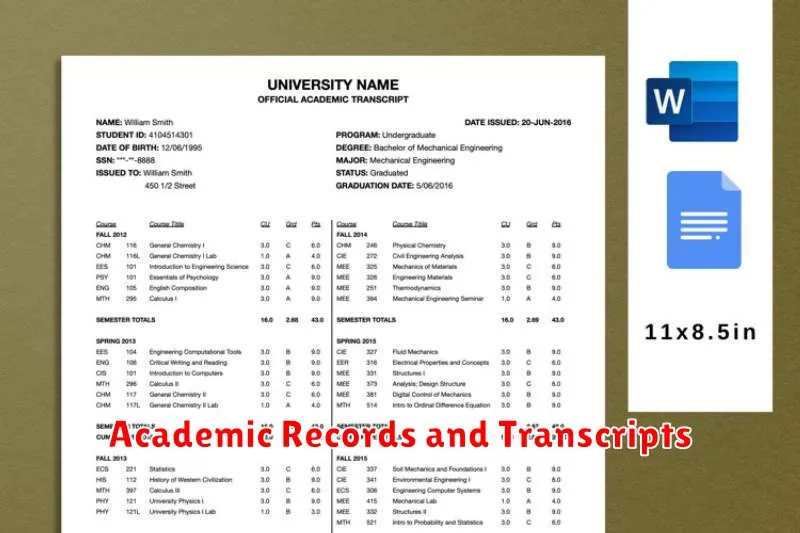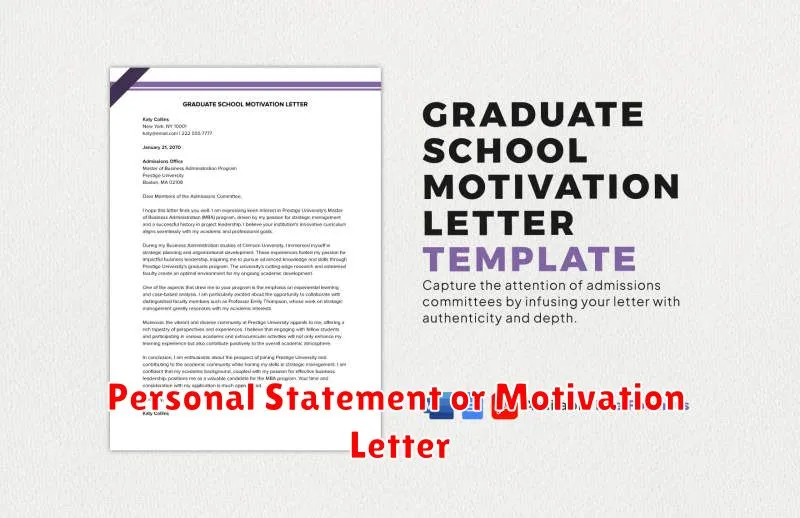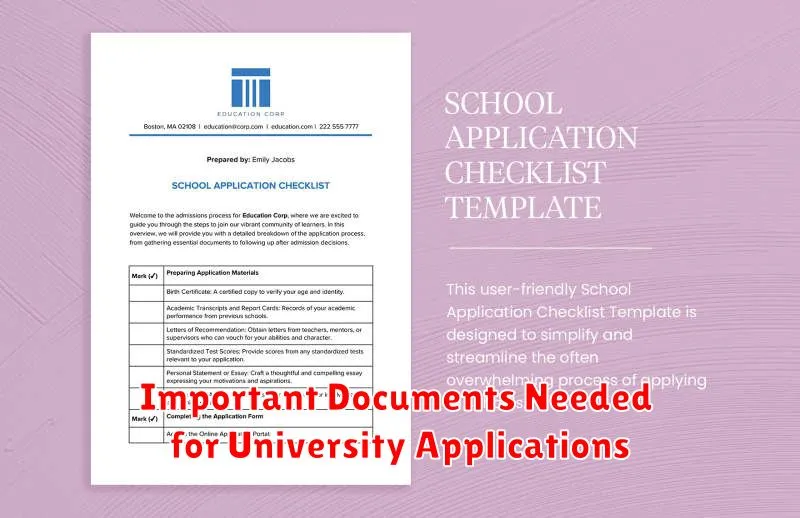Applying to university is a significant step towards your future. A successful application requires careful planning and preparation, especially when it comes to gathering the necessary documents. This article will provide a comprehensive guide to the important documents needed for university applications, ensuring you have everything you need for a smooth and successful application process. Understanding the requirements and deadlines for document submission is crucial for increasing your chances of acceptance into your desired program.
From transcripts and letters of recommendation to standardized test scores and application forms, each document plays a vital role in presenting your qualifications and candidacy to university admissions committees. Knowing what documents are required, how to obtain them, and how to present them effectively is essential. This guide will cover all the important documents needed for university applications, including specific requirements for international students and tips for organizing your application materials.
Checklist Before Starting Your Application
Before you begin your university application, it’s crucial to ensure you have everything prepared. This checklist will help streamline the process and avoid last-minute scrambling.
Academic Records
- Transcripts: Ensure you have official transcripts from all secondary and post-secondary institutions attended.
- GPA Calculation: Understand how your GPA will be calculated for application purposes.
- Test Scores: If required, confirm that your standardized test scores (e.g., SAT, ACT) are available and sent to the institutions.
Application Materials
- Essays: Begin brainstorming and drafting your application essays early. Review and revise them thoroughly.
- Letters of Recommendation: Request letters of recommendation well in advance of deadlines. Provide recommenders with ample information and materials to write a strong letter.
- Application Fees: Be prepared to pay application fees or confirm fee waiver eligibility.
Academic Records and Transcripts

Academic records and transcripts are fundamental components of your university application. They provide a comprehensive overview of your academic performance and intellectual trajectory throughout high school.
Official transcripts must be sent directly from your high school to the universities you are applying to. These documents detail every course you’ve taken, the grades you received, and your overall GPA. Some universities might also require transcripts from any college courses you’ve completed.
Ensure you request your transcripts well in advance of application deadlines, as the processing and delivery can take time. Contact your high school’s guidance counselor or registrar for instructions on how to request official transcripts. Be mindful of any associated fees.
Proof of Language Proficiency
Many universities, especially those in English-speaking countries, require international applicants to demonstrate their proficiency in the language of instruction. This is crucial for successful academic engagement.
Commonly accepted tests include TOEFL (Test of English as a Foreign Language), IELTS (International English Language Testing System), and PTE Academic (Pearson Test of English Academic). Each university sets its own minimum score requirements, so be sure to check the specific requirements of the programs you’re applying to.
Some universities may waive the language proficiency requirement if you’ve previously studied in a curriculum where the primary language of instruction was English. Be sure to verify this possibility with the admissions office.
Ensure you take the required language test well in advance of application deadlines to allow sufficient time for score reporting. Delays in receiving scores can significantly impact your application.
Personal Statement or Motivation Letter

A personal statement or motivation letter is a crucial document for your university application. It provides the admissions committee with insights into who you are beyond grades and test scores.
This document allows you to showcase your personality, skills, experiences, and aspirations. It’s your opportunity to explain why you’re interested in a particular program and how it aligns with your future goals.
Effectively, your statement answers the question: Why are you a good fit for this university and this program?
Key elements to include are:
- Relevant experiences: Highlight experiences that demonstrate your skills and passion for the chosen field.
- Academic achievements: Discuss your academic background and any relevant accomplishments.
- Career goals: Explain how this program will help you achieve your future career aspirations.
- Reasons for choosing the university: Explain what specifically attracts you to this institution.
Ensure your statement is well-written, error-free, and tailored to each university you apply to.
Letters of Recommendation
Letters of recommendation play a crucial role in your university application. They provide an external perspective on your abilities, character, and potential. These letters offer insights into your qualifications beyond grades and test scores.
Typically, universities require two to three letters of recommendation. It is important to choose recommenders who know you well and can speak to your strengths. Strong recommenders are often teachers, counselors, or mentors who have directly observed your academic capabilities and personal qualities.
Key elements a strong recommendation letter should address include your:
- Intellectual curiosity
- Academic performance
- Work ethic
- Personal character
- Contributions to the classroom or community
Give your recommenders ample time to write thoughtful letters. Provide them with information about your academic goals, the programs you’re applying to, and your resume or activity list. This will help them craft a compelling and personalized recommendation.
Passport and Identification
A valid passport is an essential document for international students applying to universities abroad. It serves as primary identification and proof of citizenship. Ensure your passport’s expiry date extends beyond the duration of your intended study program.
In addition to a passport, universities often require other forms of photo identification. This may include a national identity card or driver’s license. These secondary forms of identification are typically required for domestic applicants and can be helpful for international students for various in-country processes.
Ensure you have both physical and digital copies of all your identification documents. Securely store the originals and have easily accessible copies ready for upload during the application process. Certified copies of your passport may be requested by some institutions.
Additional Requirements by Country or Program
While the previously mentioned documents are generally required, it’s crucial to understand that additional materials may be necessary depending on your country of origin or the specific program you’re applying to. Always check the university’s official admissions website for a comprehensive list of requirements.
Some programs, such as those in the arts, may require a portfolio showcasing your creative work. Graduate programs often ask for GRE or GMAT scores, and certain research-focused programs may require writing samples or detailed research proposals.
International students should be prepared to submit certified translations of their academic documents, and may need to demonstrate English language proficiency through tests like TOEFL or IELTS. Some countries may also require students to obtain a student visa before beginning their studies.

